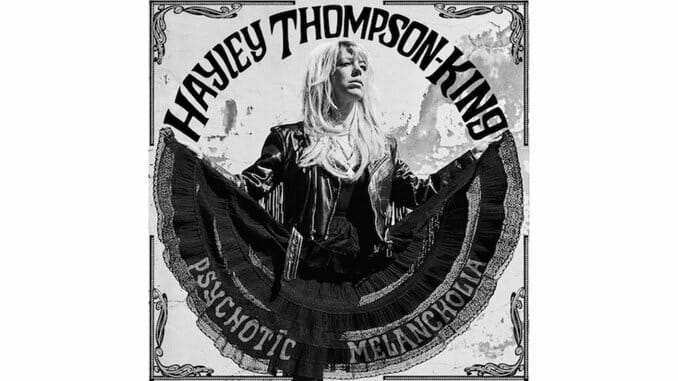Hayley Thompson-King: Psychotic Melancholia

Hayley Thompson-King ought to be an artist for whom the doors of musical success will open magically. The one-time classical singer dipped her toes into the realms of roots-rock with her former band the Banditas, and lapped in the trippy thud of psych during her tenure in longtime Boston psych-rockers Major Stars. On her debut album Psychotic Melancholia—being released on her own label, Hard to Kill Records—Thompson-King generates a lot of noise from a traditional instrumental setup. Found within the fissures of her honky-tonk swagger are elements of rock’s more dangerous cousins, as her vacillating vocal prowess easily shifts from songbird elegance to pissed-off shriek. Her songs often follow suit, and on Psychotic Melancholia, Thompson-King gathers all her riotous rock ‘n’ roll flavors and biblical criticism into one big, noisy bowl.
There is an overwhelming essence of roadhouse rock ‘n’ roll abandon on the swinging opener “Large Hall, Slow Decay,” which explodes full-throttle with a searing guitar lead and a potent juke-joint shuffle. Thompson-King darts her crooked tongue in the song’s raucous verses, singing, “So go on, light your candle/Kneel down and say a prayer for me/Cause your little fire ain’t nothin I can’t handle/And I never asked you to set me free.” The song’s break-up vibe doubles as an agnostic front that sets a template for other similarly secular, or otherwise anti-religious ravings on Psychotic Melancholia.
On probably the least bashful indication of Thompson-King’s overarching war against false idolatry, “No Room For Jesus” finds Thompson-King and her band allowing their guitar attack to bloom widely, exploring way outside the Americana, country-rock vein into a psych-rock blitzkrieg. Thompson-King’s vocal mix is very nearly peaked-out on songs with such savagery, with pops and fuzz pocked throughout these more intense tunes like badges of apathetic honor.